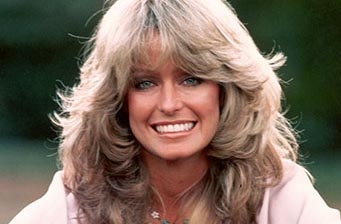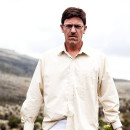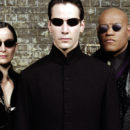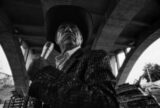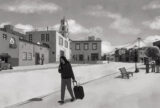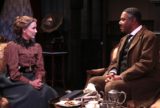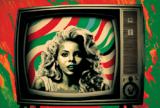Farrah Fawcett dies at age 62
06.25.2009 | By Mack Chico |

Farrah Fawcett, an actress and television star whose good looks and signature flowing hairstyle influenced a generation of women and, beginning with a celebrated pinup poster, bewitched a generation of men, died Thursday morning in Santa Monica, Calif. She was 62.
Her death, at a Santa Monica hospital, was announced by her spokesman, Paul Bloch, The Associated Press reported.
Ms. Fawcett had been battling anal cancer since late 2006, and to an extraordinary degree the fight was played out in public, generating enormous interest worldwide. Her face, often showing the ravages of cancer, became a tabloid fixture, and updates on her health became staples of television entertainment news.
In May, her cancer battle was chronicled in an NBC prime-time documentary, “Farrah’s Story,” some of it shot on home video. An estimated 9 million people viewed it. Ms. Fawcett had initiated the project with a friend and producer, Alana Stewart, after she first learned of her cancer.
Ms. Fawcett’s doctors declared her cancer-free after they removed a tumor in 2007, but her cancer returned later that year. She had been receiving alternative treatment in Germany and was hospitalized in early April for a blood clot resulting from that treatment, according to her doctor, Lawrence Piro. Her cancer had also spread to her liver, Dr. Piro told The A.P.
Ms. Fawcett’s career was a patchwork of positives and negatives, fine dramatic performances on television and on stage as well as missed opportunities. She first became famous when a poster of her in a red bathing suit, leonine mane flying, sold more than twice as many copies as posters of Marilyn Monroe and Betty Grable combined.
Ms. Fawcett won praise for her serious acting later in her career, typically as a victimized woman and notably in the television movie “The Burning Bed.”
But she remained best known for the hit 1970s television show “Charlie’s Angels,” in which she played Jill Munroe, one of three beautiful female private detectives employed by an unseen male boss who (in the voice of John Forsythe) issued directives and patronizing praise over a speaker phone. Her pinup fame had led the producers to cast her.
Ms. Fawcett and her fellow angels, played by Jaclyn Smith and Kate Jackson, brought evildoers to justice, often while posing in decoy roles that put them in skimpy outfits or provocative situations.
“Charlie’s Angels,” created and produced by Aaron Spelling and Leonard Goldberg for ABC, was a phenomenon, finishing the 1976-77 season as the No. 5 network show, the highest-rated television debut in history at that time.
Ms. Fawcett was its breakout star. Although she left the show after one season and returned only sporadically thereafter, the show’s influence — among other things, it inspired two much later feature films starring Cameron Diaz, Drew Barrymore and Lucy Liu — was so indelible that she was forever associated with it.
The series, whose popularity coincided with the burgeoning women’s movement, brought new attention to issues of female sexuality and the influence of television. Commentators debated whether the show’s three athletic, scantily clad heroines were exemplars of female strength or merely a harem of pretty puppets doing the bidding of a patriarchal leader.
As the show’s most popular star, Ms. Fawcett became another sort of poster girl, for the “jiggle TV” of the ’70s, and a lightning rod for cultural commentators. Chadwick Roberts, writing in The Journal of Popular Culture in 2003, described her “unbound, loose and abundant hair” as marking “a new emphasis on femininity after the androgyny of the late ’60s and early ’70s.”
In 1978 Playboy magazine called Ms. Fawcett “the first mass visual symbol of post-neurotic fresh-air sexuality.” She herself put it more succinctly: “When the show got to be No. 3, I figured it was our acting. When it got to be No. 1, I decided it could only be because none of us wears a bra.”
Ms. Fawcett acknowledged that her sex symbol status was a mixed blessing. It made her famous, but it often obscured the acting talent that brought her three Emmy nominations, most notably for “The Burning Bed,” a critically acclaimed movie about spousal abuse.
“I don’t think an actor ever wants to establish an image,” she said in an interview with The New York Times in 1986. “That certainly hurt me, and yet that is also what made me successful and eventually able to do more challenging roles. That’s life. Everything has positive and negative consequences.”
Ferrah Leni Fawcett was born in Corpus Christi, Tex., on Feb. 2, 1947. Her father, James, worked in the oil pipeline industry; her mother, Pauline, was a homemaker.
After dropping out of the University of Texas, Ms. Fawcett moved to Hollywood to pursue acting. She soon found work in commercials for Wella Balsam shampoo and Noxzema shaving cream, among other products. A Noxzema commercial in which she shaved the face of the football star Joe Namath was shown during the 1973 Super Bowl.
Ms. Fawcett also found acting work in television, landing guest roles on “I Dream of Jeannie,” “The Flying Nun” and other sitcoms. She appeared in four episodes of “The Six Million Dollar Man,” whose star, Lee Majors, she had married in 1973. When Ms. Fawcett was cast on “Charlie’s Angels,” she had a clause written into her contract that allowed her to leave the set every day in time to prepare dinner for Mr. Majors. She was billed as Farrah Fawcett-Majors until 1979. She and Mr. Majors divorced in
The poster that ignited Ms. Fawcett’s career was shot at the Bel Air home she shared with Mr. Majors. “She was just this sweet, innocent, beautiful young girl,” said Bruce McBroom, who took the photograph. Searching for a backdrop to Ms. Fawcett in her one-piece red swimsuit (which she chose instead of a bikini because of a childhood scar on her stomach), he grabbed an old Navajo blanket from the front seat of his 1937 pickup.
After leaving “Charlie’s Angels” to pursue a film career (she came back for guest appearances for two more seasons), Ms. Fawcett made three forgettable movies in quick succession, then salvaged her reputation by returning to television. In 1981 she starred in the mini-series “Murder in Texas,” as the wife of a doctor who is subsequently accused of murdering her; in 1984 she made “The Burning Bed,” a portrait of a battered wife.
Both movies were shown on NBC, and both performances received strong reviews. In “The Burning Bed,” Ms. Fawcett was one of the first prime-time actresses to forgo cosmetics in favor of a convincing characterization.
In 1983 she played another victimized woman who fights back — a vengeance-seeking rape victim — in the Off Broadway production of “Extremities.” She took over for Karen Allen, who had replaced Susan Sarandon. Ms. Fawcett went on to star in the film version of the play in 1986.
Other roles followed in film and television — she won praise again in the searing 1989 television movie “Small Sacrifices” — but throughout, Ms. Fawcett tended to attract more attention for her looks and personal life than for her professional accomplishments. Her 18-year relationship with the actor Ryan O’Neal, with whom she had a son, kept her on the gossip pages long after her television work had become sporadic. This month, interviewed by Barbara Walters on the ABC program “20/20,” Mr. O’Neal said he had asked Ms. Fawcett to marry her and that she had said yes.
In 1997 Ms. Fawcett negated much of the respect she had earned as an actress when, during an appearance on “Late Show With David Letterman,” she promoted a bizarre body-painting Playboy video and appeared ditsy to the point of incoherence.
But later that year she appeared in the acclaimed independent film “The Apostle” as Robert Duvall’s long-suffering wife, and her critical star rose again — only to be dimmed by publicity about a court case involving a former companion, the director James Orr. Mr. Orr was convicted of assaulting Ms. Fawcett and sentenced to three years’ probation.
Ms. Fawcett is survived by her father, James, and her son, Redmond James Fawcett O’Neal.
Though her career was volatile, Ms. Fawcett’s fame never diminished after “Charlie’s Angels.” She tried to capitalize on her celebrity with the 2005 reality series “Chasing Farrah,” but it was a critical and ratings flop. Writing in Medialife magazine, Ed Robertson described the series and its star as “a living example of a talented actress whose career has been turned into a parody by poor decisions.”
Ms. Fawcett herself described her career succinctly. “I became famous,” she said in her 1986 Times interview, “almost before I had a craft.”

